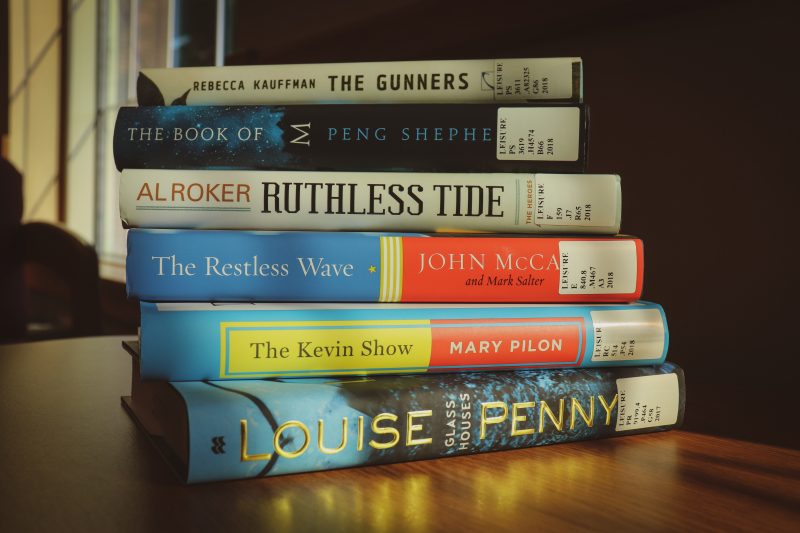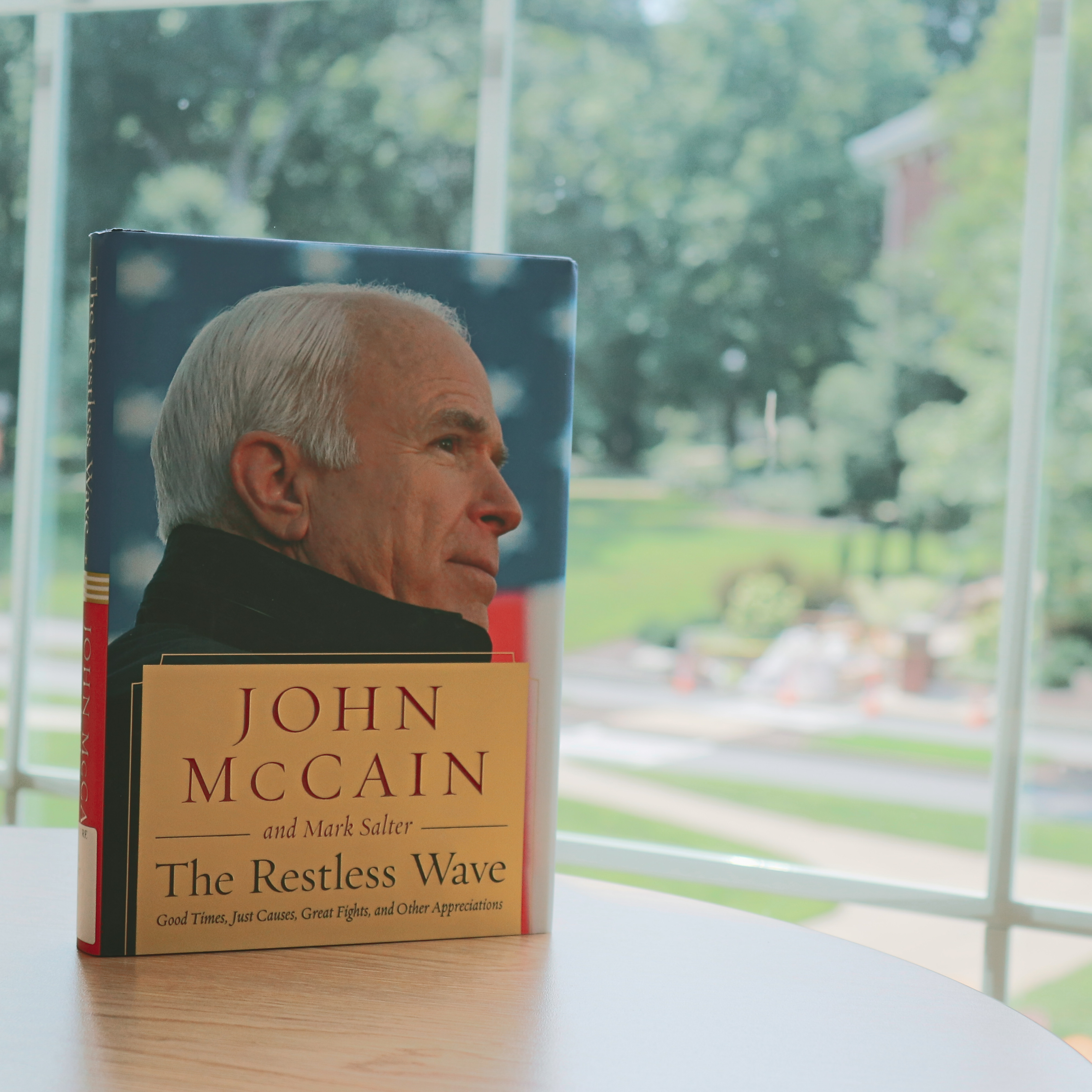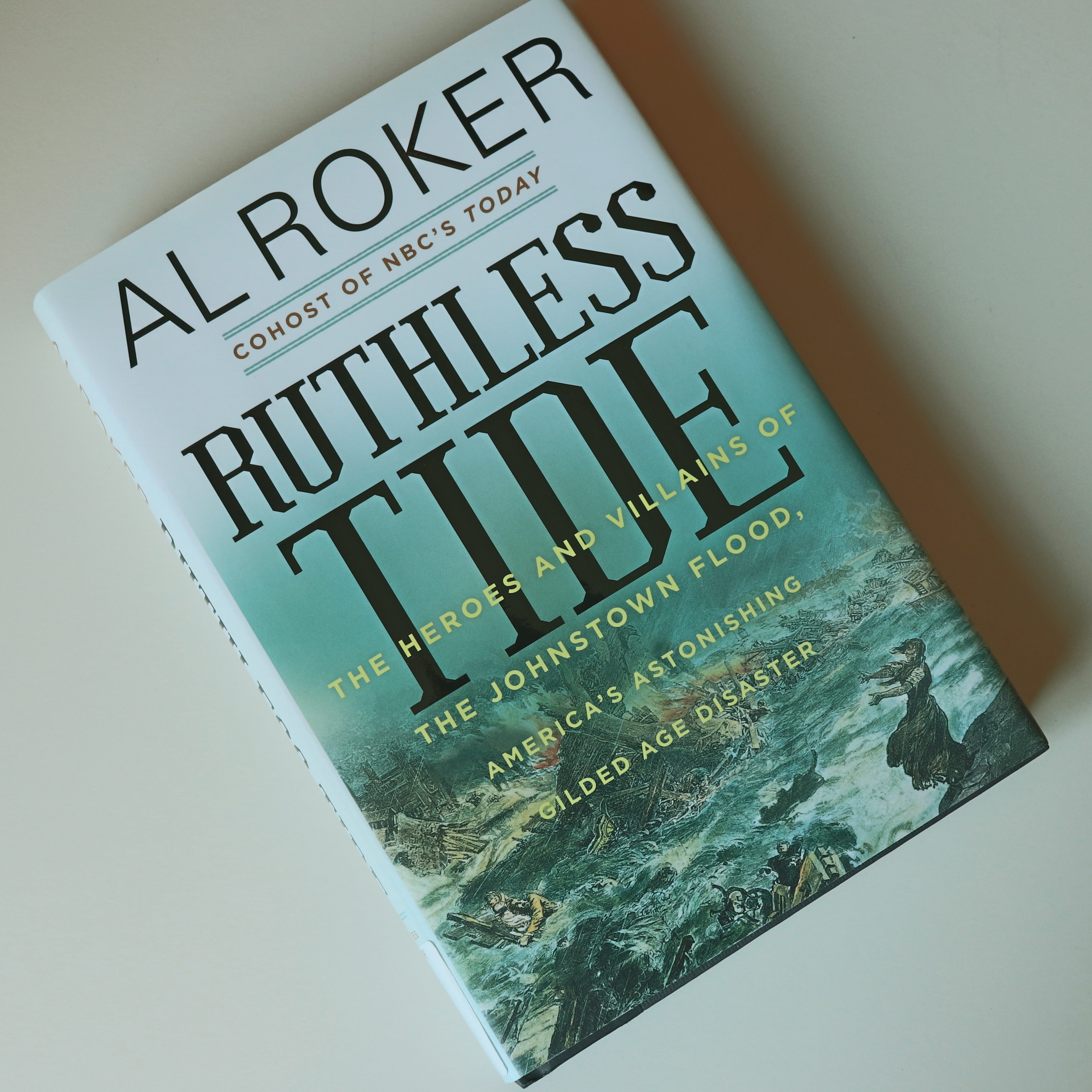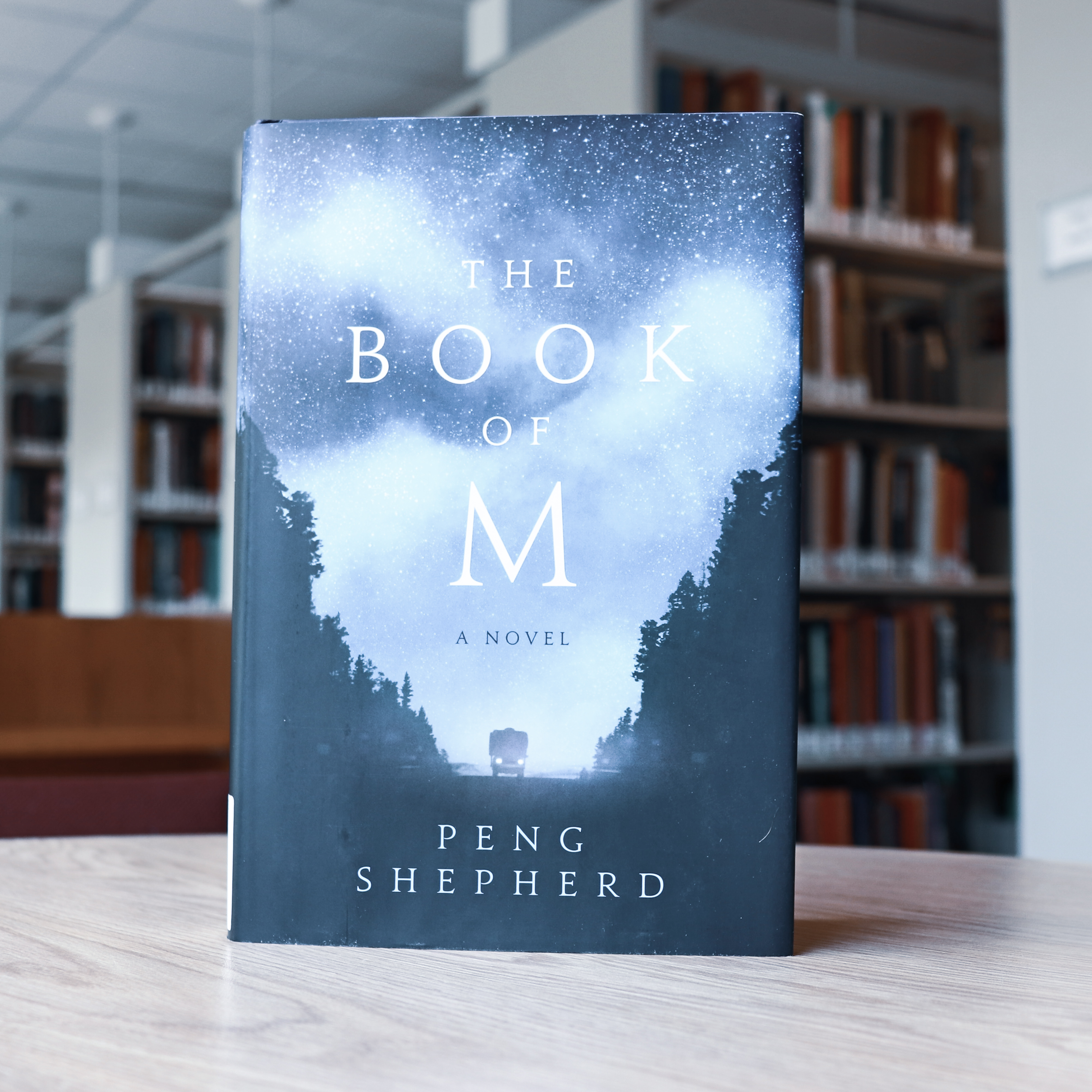
Glass Houses by Louse Penny 
When a mysterious figure appears in Three Pines one cold November day, Armand Gamache and the rest of the villagers are at first curious. Then wary. Through rain and sleet, the figure stands unmoving, staring ahead.
From the moment its shadow falls over the village, Gamache, now Chief Superintendent of the Sûreté du Québec, suspects the creature has deep roots and a dark purpose. Yet he does nothing. What can he do? Only watch and wait. And hope his mounting fears are not realized.
But when the figure vanishes overnight and a body is discovered, it falls to Gamache to discover if a debt has been paid or levied.
Months later, on a steamy July day as the trial for the accused begins in Montréal, Chief Superintendent Gamache continues to struggle with actions he set in motion that bitter November, from which there is no going back. More than the accused is on trial. Gamache’s own conscience is standing in judgment.
In Glass Houses, her latest utterly gripping book, number-one New York Times bestselling author Louise Penny shatters the conventions of the crime novel to explore what Gandhi called the court of conscience. A court that supersedes all others.
 The Kevin Show by Mary Pilon
The Kevin Show by Mary Pilon
Meet Kevin Hall: brother, son, husband, father, and Olympic sailor. Kevin has an Ivy League degree, a winning smile, and throughout his adult life, he has been engaged in an ongoing battle with a person that doesn’t exist to anyone but him: the Director. In the tradition of Kay Redfield Jamison’s An Unquiet Mind, journalist and NYT bestselling author Mary Pilon’s The Kevin Show reveals the many-sided struggle–of Kevin, his family, and the medical profession–to understand and treat a psychiatric disorder whose euphoric highs and creative ties to pop culture have become inextricable from Kevin’s experience of himself.
Kevin suffers from what doctors are beginning to call the “Truman Show” delusion, a form of bipolar disorder named for the 1998 movie in which the main character realizes he is the star of a reality TV show. When the Director commands Kevin to do things, the results often lead to handcuffs, hospitalization, or both. Once he nearly drove a car into Boston Harbor. His girlfriend, now wife, was in the passenger seat.
Interweaving Kevin’s perspective–including excerpts from his journals and sketches–with police reports, medical records, and interviews with those who were present at key moments in his life, The Kevin Show is a bracing, suspenseful, and eye-opening view of the role that mental health plays in a seemingly ordinary life.
The Restless Wave by John McCain 
“I don’t know how much longer I’ll be here. Maybe I’ll have another five years. Maybe, with the advances in oncology, they’ll find new treatments for my cancer that will extend my life. Maybe I’ll be gone before you read this. My predicament is, well, rather unpredictable. But I’m prepared for either contingency, or at least I’m getting prepared. I have some things I’d like to take care of first, some work that needs finishing, and some people I need to see. And I want to talk to my fellow Americans a little more if I may.”
So writes John McCain in this inspiring, moving, frank, and deeply personal memoir. Written while confronting a mortal illness, McCain looks back with appreciation on his years in the Senate, his historic 2008 campaign for the presidency against Barack Obama, and his crusades on behalf of democracy and human rights in Eastern Europe and the Middle East.
Always the fighter, McCain attacks the “spurious nationalism” and political polarization afflicting American policy. He makes an impassioned case for democratic internationalism and bi-partisanship. He tells stories of his most satisfying moments of public service, including his work with another giant of the Senate, Edward M. Kennedy. Senator McCain recalls his disagreements with several presidents, and minces no words in his objections to some of President Trump’s statements and policies. At the same time, he offers a positive vision of America that looks beyond the Trump presidency.
The Restless Wave is John McCain at his best.
 Ruthless Tide by Al Roker
Ruthless Tide by Al Roker
Central Pennsylvania, May 31, 1889: After a deluge of rain—nearly a foot in less than twenty-four hours—swelled the Little Conemaugh River, panicked engineers watched helplessly as swiftly rising waters threatened to breach the South Fork dam, built to create a private lake for a fishing and hunting club that counted among its members Andrew Mellon, Henry Clay Frick, and Andrew Carnegie. Though the engineers telegraphed neighboring towns on this last morning in May warning of the impending danger, residents—factory workers and their families—remained in their homes, having grown used to false alarms.
At 3:10 P.M., the dam gave way, releasing 20 million tons of water. Gathering speed as it flowed southwest, the deluge wiped out nearly everything in its path and picked up debris—trees, houses, animals—before reaching Johnstown, a vibrant steel town fourteen miles downstream. Traveling 40 miles an hour, with swells as high as 60 feet, the deadly floodwaters razed the mill town—home to 20,000 people—in minutes. The Great Flood, as it would come to be called, remains the deadliest in US history, killing more than 2,200 people and causing $17 million in damage.
In Ruthless Tide, Al Roker follows an unforgettable cast of characters whose fates converged because of that tragic day, including John Parke, the engineer whose heroic efforts failed to save the dam; the robber barons whose fancy sport fishing resort was responsible for modifications that weakened the dam; and Clara Barton, the founder of the American Red Cross, who spent five months in Johnstown leading one of the first organized disaster relief efforts in the United States. Weaving together their stories and those of many ordinary citizens whose lives were forever altered by the event, Ruthless Tide is testament to the power of the human spirit in times of tragedy and also a timely warning about the dangers of greed, inequality, neglected infrastructure, and the ferocious, uncontrollable power of nature.
The Book of M by Peng Shepherd 
Set in a dangerous near future world, The Book of M tells the captivating story of a group of ordinary people caught in an extraordinary catastrophe who risk everything to save the ones they love. It is a sweeping debut that illuminates the power that memories have not only on the heart, but on the world itself.
One afternoon at an outdoor market in India, a man’s shadow disappears—an occurrence science cannot explain. He is only the first. The phenomenon spreads like a plague, and while those afflicted gain a strange new power, it comes at a horrible price: the loss of all their memories.
Ory and his wife Max have escaped the Forgetting so far by hiding in an abandoned hotel deep in the woods. Their new life feels almost normal, until one day Max’s shadow disappears too.
Knowing that the more she forgets, the more dangerous she will become to Ory, Max runs away. But Ory refuses to give up the time they have left together. Desperate to find Max before her memory disappears completely, he follows her trail across a perilous, unrecognizable world, braving the threat of roaming bandits, the call to a new war being waged on the ruins of the capital, and the rise of a sinister cult that worships the shadowless.
As they journey, each searches for answers: for Ory, about love, about survival, about hope; and for Max, about a new force growing in the south that may hold the cure.
Like The Passage and Station Eleven, this haunting, thought-provoking, and beautiful novel explores fundamental questions of memory, connection, and what it means to be human in a world turned upside down.
 The Gunners by Rebecca Kauffman
The Gunners by Rebecca Kauffman
Following her wonderfully received first novel, Another Place You’ve Never Been, called “mesmerizing,” “powerful,” and “gorgeous,” by critics all over the country, Rebecca Kauffman returns with Mikey Callahan, a thirty-year-old who is suffering from the clouded vision of macular degeneration. He struggles to establish human connections―even his emotional life is a blur.
As the novel begins, he is reconnecting with “The Gunners,” his group of childhood friends, after one of their members has committed suicide. Sally had distanced herself from all of them before ending her life, and she died harboring secrets about the group and its individuals. Mikey especially needs to confront dark secrets about his own past and his father. How much of this darkness accounts for the emotional stupor Mikey is suffering from as he reaches his maturity? And can The Gunners, prompted by Sally’s death, find their way to a new day? The core of this adventure, made by Mikey, Alice, Lynn, Jimmy, and Sam, becomes a search for the core of truth, friendship, and forgiveness.
A quietly startling, beautiful book, The Gunners engages us with vividly unforgettable characters, and advances Rebecca Kauffman’s place as one of the most important young writers of her generation.
You must be logged in to post a comment.